- Thursday, 19 February 2026
Call For Respecting Popular Sovereignty
Conscious Nepalis have now begun to realise that the nation’s survival and independence and their welfare, rest on self-determining its politics, laws and progress without undue outside interference. People’s sovereignty assumes the primacy of their well-being over the interests of foreigners or non-stakeholding elites. The negative liberties of Nepalis enable them to oppose harmful internal activities, prompting them to resist both coercion of the national polity and international regime under the “principle of affected.” The coercive power of the Nepali state and cooperative power of its people are interlinked; the former establishes state sovereignty while the latter popular sovereignty.
The sovereign state offers vital choices for its people to set ecological, social, economic, cultural and political policies and fulfill their constitutional and human rights. The animation of legislative, representative and discursive power of Nepalis is the soul of their sovereignty. It sets up their right to development. Nepalis have fought against all regimes when they are denied these rights and opened a hiatus between the borrowed ideas, ideologies and theories that anesthetised elites and historically aware people about their freedom of choice without being dictated by the doctrine of necessity.
Primacy of individual freedom
The notion of human rights assumes the primacy of individual freedom, equality and autonomy, avowing the essence of the information revolution that made each self-thinking, acting and judging person. The Nepali constitution embodies that the sovereignty of the state hinges on its people. They are given 31 constitutional rights and 4 duties. By investing rights and sovereignty in people as co-equals, it aims to bring social discipline and order, an order that wards off the tyranny of the majority and alienation of the minority. It eases the extension of their rights in various spheres to promote an egalitarian society and claim nationality and humanity.
Nepalis are the source of political legitimacy, authority and rule. This means their conscious participation in the public sphere and their productive engagement in shaping their policy priorities affirm the notion of self-rule. Their democratic struggle has linked them to a global audience and entered the regime of universal knowledge, aid, investment, trade, technology and several obligations but also opportunities flashing upon national viability and sovereign identity in world politics.
Need for choice: People’s sovereignty is based on choice. But Nepal’s structural adjustment to and participation in international regimes have become a conduit for bringing in many fads of administrative, educational, social, economic and political practices, most of which are inapt to satisfy the diversity of Nepali society’s choice. Recurring democratic struggles of people for self-rule have refuted the adequacy of these fads and falsified the belief in reformist plans based on the equation of powerful parties that only intensified political instability, poverty, inequality and deprivation thriving in a form of reflexive development.
It is rationalised by socially ripped intellectuals who are blind to the need to uplift the lived life of Nepalis and improve the state of backwardness. The rights of Nepalis to sovereignty, justice and solidarity reaffirm their vitality in social, cultural, economic and political dimensions. They are vital elements for the realisation of their constitutional rights to enter into national citizenship and universal beings of civilised life.
Leadership virtue: Nepali leaders grew up with the commitment to the equality of people to improve their moral unity and stand above the self-seeking nature rooted in feudalism and patriarchy. The dharma of leadership is an impersonal public duty. This duty balances the personal passion of self-inflation with the necessity of public life. Virtuous leaders educate the public in their native culture, achieve the constitutional goal of an egalitarian society and attain the ethical end of political efficacy as per yug dharma.
Those less imbued with cultural learning fail to represent the people’s spiritual norms, style, dress, values and views in public forums. They fail to grasp national goals unless there is a just distribution of information, property and power and improve the civic virtues and ability of people to select organic intellectuals, civil society and business entrepreneurship, enabling them to tackle their problems in their own contexts and concepts.
Nepal entails cognitive liberation of the syllabus of educational institutions, political parties and planning from those conceptually exiled from the native knowledge and context. To redeem sovereign life requires freedom from the domination of irrelevant ideals, corporate overlords, bureaucrats and experts lubricated by external agencies and interest groups thriving in a de-contextualised perspective, rule, power and authority. Virtuous leadership often liberates people from fatalism and determinism, fulfills the vocational needs of society and defeats the stubborn inertia of politics, learns from rational feedback and pursues constitutional vision.
It induces timely change in the direction of equality and arrests the drift toward lapsing of public security and public order. So long as Nepali leaders are flummoxed by conceptual ambiguity and exiled from a historically evolved native worldview, they will continue to face a tradeoff between performance and integrity, thus unlocking inflexible choice to popular sovereignty. Only the nation’s historical sense of justice at ecological, social, gender and intergenerational planes can touch democratic opening.
Space for popular power: The space for popular power springs from Nepalis’ ability to resist the culture of domination through educational, legal, economic and political policies and re-composition of their power to renew their capacity for imagination, shape priorities and create institutions and leadership for political mobilisation and collective action. Their engagement in social and political struggle can transform educational institutions, parties, civil society and polity in a reflective direction.
It allows the attentive public to critically defy injustice in the domain of their existence and control leaders’ continuous fall of their ethical standards. Obviously, crafting a political culture to satisfy the basic needs of Nepalis is urgent so that they do not have to look for a global market, leaving the national society, economy and polity stagnated and stripped of the power to exercise sovereignty.
Equal social integration of men and women and social classes in the life of the nation is vital to make society inclusive and surmount the dichotomy between the borrowed existence of elites and leaders and contextual compassion of people titillated by social media. Nepalis’ claim of sovereignty requires their active participation in the entire planning cycle of development and governance that involves direction, admin, budgeting, monitoring and coordination of public policies and finance.
Decentralised local and national strategies rooted in the apt harnessing of natural resources such as hydro, tourism, medicinal plants, forestry products, agriculture, industry, service sectors, etc., are central to rediscover the vitality and resilience of historicity, culture and lineage of knowledge without being an object of social engineering.
The Nepali state has to focus on developing skills, knowledge, innovation, technology, labour productivity, saving and investments to build bridges across real and symbolic economies. It constantly develops the nexus of representation by tapering off social vices and spawns civic competence of people, a belief that their thinking, judgment, choice and action can shape the nation’s overall progress in a sovereign way.
Self-help restores people’s poise: Mobilisation of energy of Nepalis and the tradition of mutual help aid them to cultivate against neurotic consumerism dictated by the global economic system advertised by profit-seeking media. It damps down the use of local products pooled through national control over natural resources, labour and nature-sensitive technology and shores up the needs for production and trade diversification.
The communitarian tradition of Nepalis gives preference to community welfare over individual profits, as opposed to Anglo-Saxon elites who have reduced the Nepali state to a minimalist role, polity to the re-embodiment of power equation and market and politics to a Darwinian reflex of the individual survival of the fittest, not building solidarity and organisation of hope for national collective action.
Self-help nourishes subsidiarity, local policy making, leadership, admin and management in people’s hands, which ensures the sustainability of projects. It abhors the postmodernist inclination of identity politics, which fails to unveil the repression of anguished people and weakens the geography of their identity of national citizenship, thus defying unity across social, economic and cultural differences for the sparkle of sovereignty.
True interdependence
Genuine interdependence: True interdependence creates reciprocal effects on both opportunities and vulnerabilities for people and nation-states. As vulnerability reduces their ability to fight Nepali loath dependence, unequal adjustment and linear sorts of globalisation in favour of a just international order where rules of the game and mutual interests are codetermined. Overall national progress of Nepal requires bridging the gaps across regions, gender and populations to coordinate local, national and global alternatives.
The spirit of peoplehood requires ethical, moral and spiritual vision rooted in the web of life of entire species beings, where conscious Nepalis can critique, confront and defy the hegemonic model of society, economy and polity and gain maturity in learning, living and acting together. This presupposes them to claim the sovereign state and various levels of governance to cope with the condition of underdevelopment and pursue their own thinking, feeling and pursuing the right course of action in matters of popular sovereignty, liberty, justice and dignity.
(Former Reader at the Department of Political Science, TU, Dahal writes on political and social issues.)



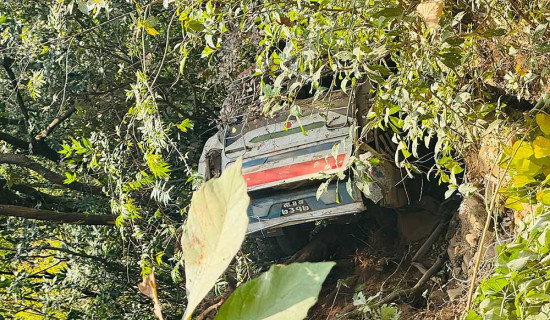
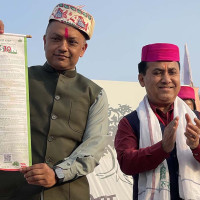
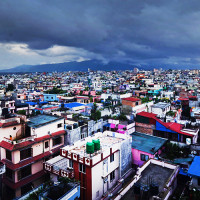
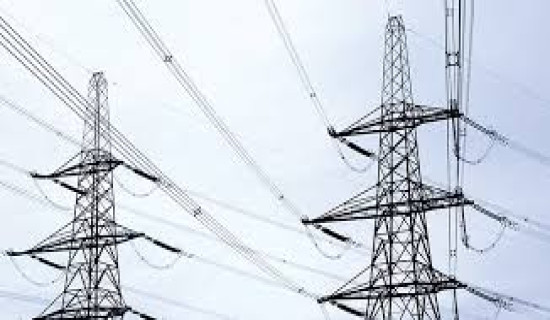
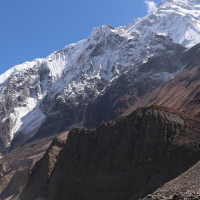
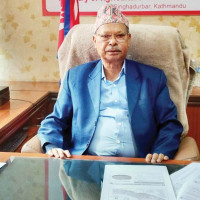
-original-thumb.jpg)






